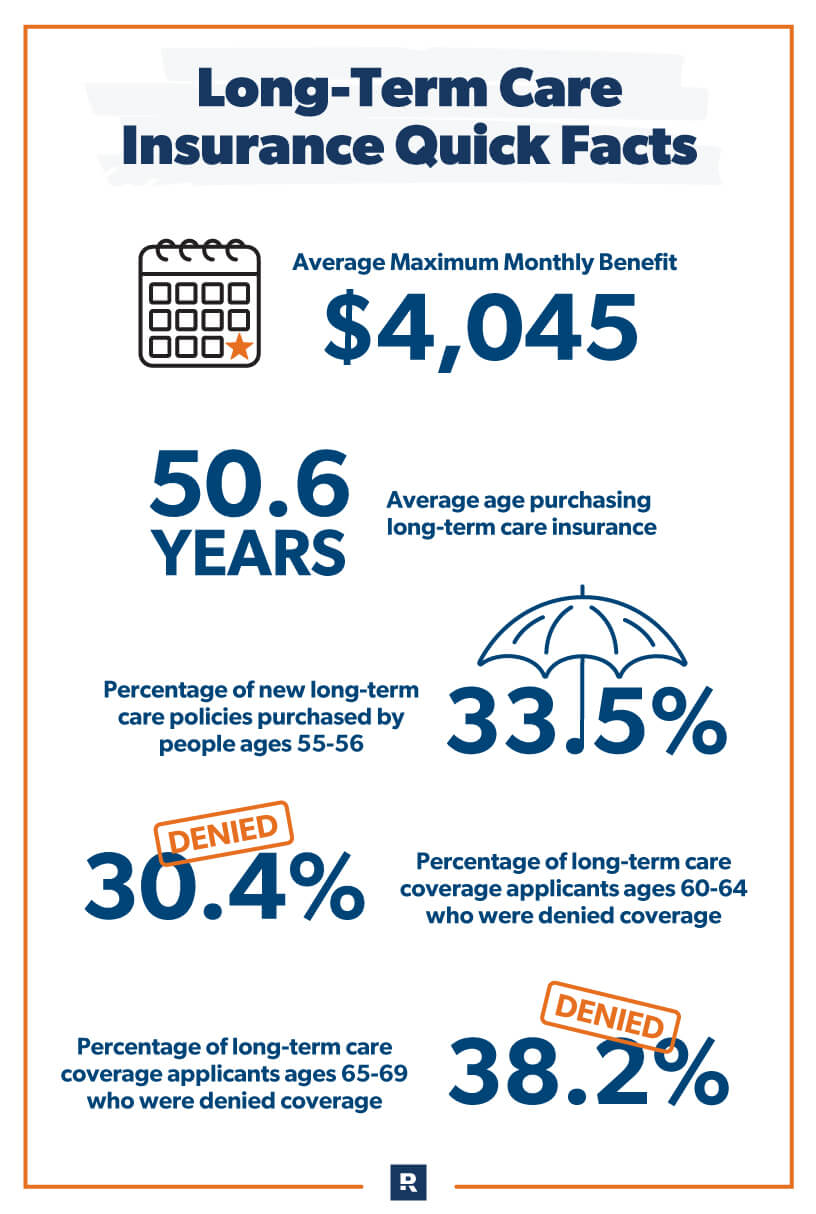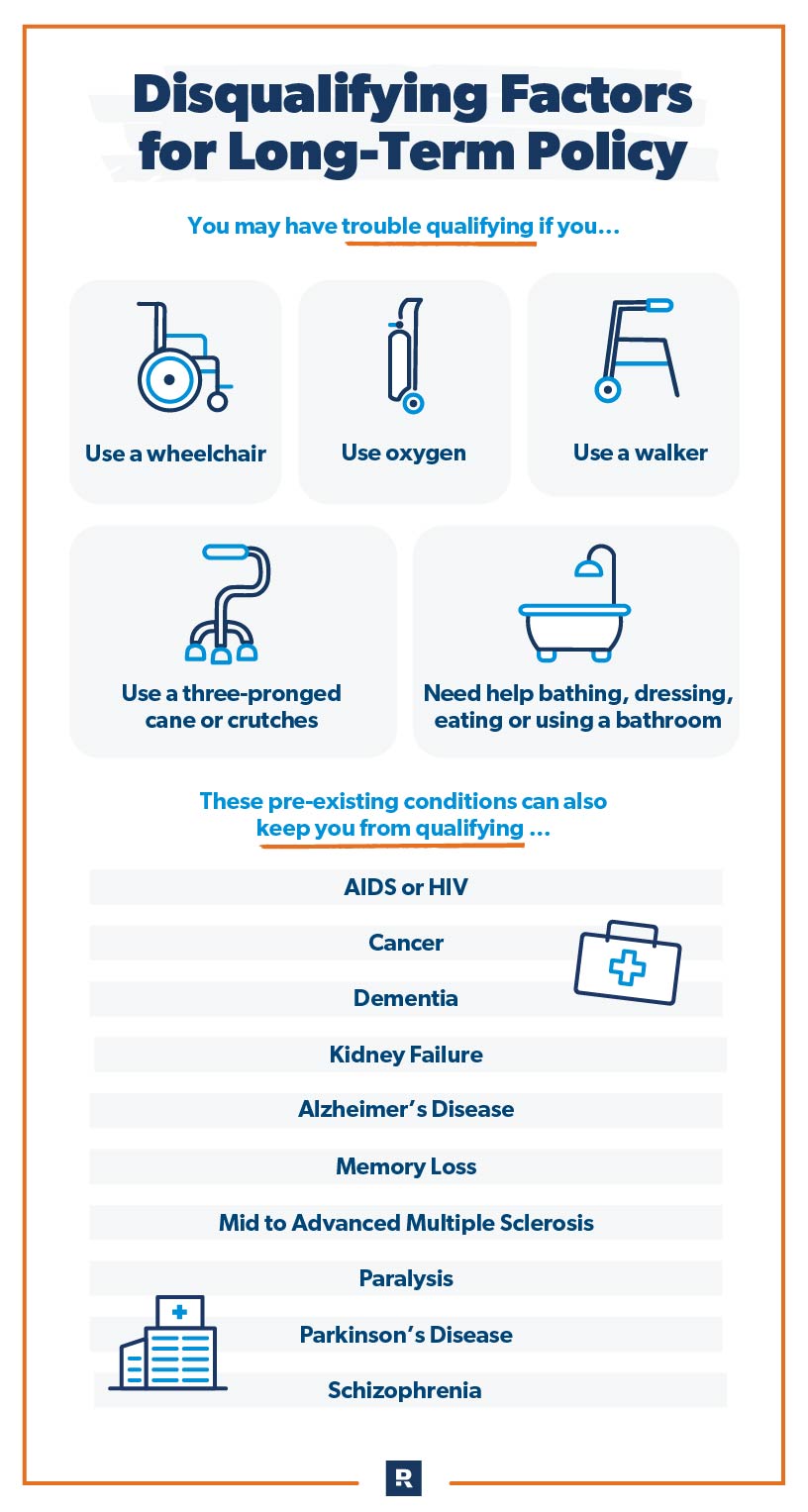
70% of 65 year olds today will need long-term care. 1

Our RamseyTrusted® insurance pros are ready to guide you toward a plan that gives you confidence in your financial future.

Learn more about Long-Term Care insurance.
Long-term care (LTC) insurance helps cover costs related to a nursing home stay or assisted living facility. It can also cover the cost of caretakers coming to your house when you need help with daily activities, like getting dressed or taking a bath, due to health issues or because you’re just getting older.

70% of 65 year olds today will need long-term care. 1

20% will need it for more than five years.2

The federal government estimates the average 65-year-old will end up needing $324,900 worth of care.3

One of our RamseyTrusted independent insurance agents will show you how much insurance you need and what term length is best for you. Once you get your policy, you’ll pay an annual premium for the length of your term.
When you set up your policy, you’ll choose a 1–3-month elimination period. It’s sort of like a deductible. When you need care, you’ll have to pay those costs out of pocket for 1–3 months. After that, your insurance covers you.


Payments are most commonly distributed with a daily limit, but some policies also offer monthly limits. Your care will need to remain within those daily or monthly limits. Anything extra will be an out-of-pocket expense. If you don’t recover before your long-term care insurance is up, you’ll have to depend on your own resources or Medicaid.

RamseyTrusted pros are interviewed, vetted and coached to make sure they’re market experts who have your best interest at heart.
Your pro will shop the insurance market and compare long-term care insurance quotes and discounts for you at no extra cost—so you can sit back, relax and know you’re getting the right coverage.
RamseyTrusted pros make sure you have all the coverage you need and nothing you don’t. You’ll get the right insurance that could save you big time down the road.
It varies widely depending on your demographics. Yearly premiums can run as low as $1,000 to around $10,000.
The average 60-year-old man will pay $1,200 per year for a policy that covers $165,000 in care. The average 60-year-old woman will pay $1,960 for the same level of coverage.4 According to federal data, women outlive men by about five years and need an average of 3.7 years of care as opposed to only 2.2 years for the average man.5,6


• Certain states allow you to count some or all of your premiums as tax-deductible medical expenses.
• The money you receive from your insurer to cover long-term expenses isn’t usually counted toward your income.
• Depending on your age, you could potentially deduct a maximum amount of premiums up to $5,960.7

Enter your zip code and answer a few quick questions about yourself.

Match with a RamseyTrusted pro in your area. They’ll contact you within 24 hours and compare quotes for you.

Work with your pro to choose the right coverage at the right price.


Only pros and providers who do whatever it takes to help you win earn the RamseyTrusted shield. And when it comes to insurance, these folks are determined to get you the coverage you need and nothing you don’t. Seriously—we’d send our moms to them (and most of us have).
Yes! Without long-term care insurance, you’ll have to pay out-of-pocket—and that’s expensive. Long-term care costs around $234,000 in the last five years of a person’s life—or $367,000 if that person has dementia.1 If you have a high enough net worth, you may be able to self-insure. But if you can’t pay, you’ll have to depend on your family and friends to care for you at home or pay for professional care.
At age 60. You’ll pay way lower premiums than someone who waits until they’re older to get coverage, and you won’t waste money on premiums in your 50s when you’re unlikely to need long-term care. Learn more about the right time to buy long-term care insurance.
Yes. And if they won’t do it themselves, you probably should.
You’ll pick a term (a time of 1–10 years) and benefit (the amount your insurer will pay). When you need in-home, assisted living or nursing home care, your insurer will pay your monthly benefit to help cover those costs for the length of your term.
It depends on factors like your age, health, gender and location. You’ll also pay more if you choose a longer term, bigger benefit or inflation protection. Yearly premiums can run as low as $1,000 to around $10,000. Learn more about the costs of long-term care insurance.
Long-term care insurance covers a lot of in-home care costs—including medical care and equipment, task assistance, and home modifications. So if it’s your goal to stay at home, long-term care insurance is a must. It also covers services outside your home like nursing homes, assisted living facilities and adult day care.
(Spoiler alert: Medicare won’t cover many of those costs.)
Yes . . . and no. Medicare covers some costs, but you have to pay the rest. If you can’t, the government can come after your spouse and kids to collect that debt after you pass away. And to add insult to injury, Medicare has lots of limits—so you won’t be able to choose the type or quality of care you deserve.
To encourage folks to buy long-term care insurance and to relieve some of the burden on Medicaid, the government created a partnership plan. State partnership plans let people receive Medicaid benefits after their LTC insurance runs out while protecting their assets (like their home), and it works on a one-to-one ratio. Typically, the government will confiscate assets to pay for any Medicaid you use. With the partnership plan, if you buy $100,000 of LTC insurance, you then get $100,000 in asset protection if you need to use Medicaid because your LTC insurance ran out.
No. Unfortunately, health insurance policies don’t cover long-term care costs.
In some situations, yes. Long-term care insurers may deny you if you have certain health issues. A RamseyTrusted pro can help you find out if you qualify for traditional long-term care insurance. And if you do have a disqualifying health issue, they’ll help you understand your other options—so you can get the care you deserve.
RamseyTrusted pros are licensed insurance agents who live and work all over the country. They partner with Ramsey because they believe the same thing we do: that getting the right long-term care insurance is an important part of protecting your financial future. That’s why we trust them to serve our customers!
Learn how Ramsey Solutions helps people take control of their finances. Or take a minute to meet our founder, Dave Ramsey.
Independent. They can compare long-term care insurance quotes from multiple local and national insurers to find you the best coverage.
They’re reliable, so they’ll be there when you need them—from shopping for quotes to helping you file claims. And they’ve got the heart of a teacher, so they’ll actually help you understand your long-term care insurance.
Nope! You just pay your insurance premium like normal—no catch, no extra costs.
8 MIN READ | FEB 13, 2024

By Rachel Cruz
I get it—long-term care isn’t an easy subject to deal with. No one wants to think about themselves or their loved ones being unable to live on their own.
But hear me out: Even though long-term care is an uncomfortable topic, it’s a super important one. That’s because some kind of long-term care—like living in a nursing home, assisted living facility, or needing in-home care—is likely in your future, so you need to think about how you’re going to pay for it.
My guess is you probably already have some questions, like, Is long-term care insurance really necessary? and How do you know if you actually need it? You might also be wondering whether Medicare will cover the costs of long-term care.
So, let’s look at who needs long-term care insurance and how much you can expect to pay for it. That way, you can put together a solid plan for your future.
Long-term care insurance covers the cost for a nursing home, assisted living facility, or in-home care when you get older and start dealing with health issues. Long-term care is defined as any care that is longer than three months.
Long-term care insurance also covers things like adult day care services, home modifications, and care coordination (or management). For many people, it allows them to protect their retirement savings while also living in their home longer. It’s also one of the eight types of insurance you need.
If you’re currently healthy, you might be wondering, Do I need long-term care insurance? Yes! You aren’t required by any laws to purchase long-term care insurance, but you still need a policy because odds are you’ll end up needing long-term care—and it’s not cheap.
The numbers say 7 out of 10 Americans over 65 will need long-term care, and an estimated 20% of Americans will need it for longer than five years.1 And the typical cost of just one month in a nursing home in the United States is $8,910!2
That’s insane, you guys. Unless you’ve built enough wealth to be self-insured and pay for that cost yourself, long-term care insurance is the best way to make sure you don’t end up running out of money toward the end of your life. Regular health insurance won’t cover those costs, but long-term care insurance will.
Now, you might be wondering whether there are any government programs that can help. Well, for starters, Medicare will not cover long-term care costs. And while Medicaid—the government program designed for people who truly don’t have any money—will cover some long-term care expenses, it should never be your first choice because you’ll have to spend all your assets before you receive help.
So, if you wouldn’t feel comfortable writing a check for $9,000 every month for a few years, you’ll want long-term care insurance.

Milliman Long Term Care Insurance Survey3
Yes, long-term care insurance is definitely worth it. Even though it can be expensive, most policies work out to be a bargain in the long run, considering what you get in return. The reality is, most Americans simply will not be able to afford the super high costs of long-term care. Or they’ll have to dip into their savings or retirement funds to pay for it, which is a terrible plan!
Long-term care insurance also allows you to live in your home longer because it pays for things like in-home care and home modifications (like adding a wheelchair ramp).
Another benefit is that your family and friends won’t be burdened with every aspect of your care. You can spend more quality time with them without relying on your grown kids or friends to come over every day to help.
With long-term care insurance, you’ll enter your golden years with a plan, and your quality of life will be better than if you were constantly trying to cut costs. Your long-term care insurance premiums may seem expensive now, but they’ll be worth it later when you start getting those long-term care bills in the mail.
Depending on factors like your age, gender, health and family health history, the cost of long-term care insurance can be affordable. For others, it can be more expensive. The cost also varies depending on where you live and what kind of policy you pick.
The average 60-year-old man will pay $1,200 per year for a policy that covers $165,000 in care. The average 60-year-old woman will pay $1,960 for the same coverage.4 (Because women tend to outlive men, insurance companies require them to fork over more money to make up for the added risk.) The average 60-year-old couple will pay $2,550 a year for a combined policy.5 The couples discount ranges from 15–30%, depending on where you live.6
It’s also important to know that long-term care insurers can increase your rates after you sign up, so don’t be surprised if your rates climb. But here’s a silver lining: Long-term care insurance premiums are tax-deductible up to certain limits, so you could save some money there.
I recommend getting long-term care insurance when you turn 60. Think of it as a birthday present! (Okay, that doesn’t have to be the only present you get, but it’s an important one.)
About 92% of long-term care claims are filed by people older than age 70, with most new claims starting after age 80.7 That’s why it doesn’t make sense to purchase a long-term care insurance policy any earlier than age 60. You don’t want to dish out money for an extra decade when you don’t need to.
But keep in mind that insurance isn’t one-size-fits-all. You need to do what’s right for you and your family. If you or your spouse has a family history of illness at a young age, or either of you are currently dealing with big health issues, you might need to get long-term care insurance earlier. The peace of mind you’ll have is worth more than any cash you’ll save on premiums. But don’t do it because you’re afraid of what might happen. If it’s not likely to happen, wait until you’re 60.
You may have heard you’ll pay less and lock in a lower premium if you buy your policy at age 50, but don’t forget that insurers can change your premium after you buy your policy.

When a RamseyTrusted pro is in your corner, you'll have peace of mind knowing you’ve got the right long-term care insurance that won't break the bank.
While buying a long-term care policy is almost always a great idea, not everyone qualifies to buy it. Unfortunately, certain health issues make insuring some people too expensive for carriers.
You’ll have trouble qualifying if you already:

A preexisting condition can also keep you from being able to get a long-term care policy. Here is a list of major health conditions that disqualify people:
A preexisting condition can also keep you from being able to get a long-term care policy. Here is a list of major health conditions that disqualify people:
The best long-term care insurance policy is the one that fits your budget and covers your future needs.
Make sure the policy you choose will pay you enough to keep your retirement savings intact. If you’re on a tight budget, you can try lowering your premium by choosing a longer elimination period (the time you have to wait between when you start receiving long-term care and when your insurance begins paying the bills)—but only if you can afford to pay for three months of care out-of-pocket.
The best way to make sure you get the right policy, though, is to talk with an independent insurance agent. They’ll answer all your questions, shop around with several different long-term care companies, and get you quotes that can save you thousands of dollars and loads of unnecessary worries.
Rachel Cruze is a #1 New York Times bestselling author, financial expert, and host of The Rachel Cruze Show. Rachel writes and speaks on personal finances, budgeting, investing and money trends. As a co-host of The Ramsey Show, America’s second-largest talk radio show, Rachel reaches millions of weekly listeners with her personal finance advice. She has appeared on Good Morning America and Fox News and has been featured in publications such as Time, Real Simple and Women’s Health magazines. Through her shows, books, syndicated columns and speaking events, Rachel shares fun, practical ways to take control of your money and create a life you love. Learn More.

Wondering, What is long-term care insurance? We’ve got all the info to help you know whether you need it, how much it is and more.

Long-term care is expensive. Like seriously expensive. You need a plan to pay for it so you don’t end up wiping out that nest egg you worked so hard for. Long-term care insurance is that plan.

Is long-term care insurance worth it? Or is it a scam? What are the pros and cons of long-term care insurance? Learn when it’s right for you.